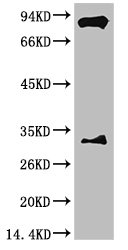![IHC-P analysis of mouse brain tissue using GTX34039 HIF1 beta antibody [4C5]. Dilution : 1:200 IHC-P analysis of mouse brain tissue using GTX34039 HIF1 beta antibody [4C5]. Dilution : 1:200](https://www.genetex.com/upload/website/prouct_img/normal/GTX34039/GTX34039_20200622_IHC-P_374_w_23060801_365.webp)
IHC-P analysis of mouse brain tissue using GTX34039 HIF1 beta antibody [4C5]. Dilution : 1:200
HIF1 beta antibody [4C5]
GTX34039
ApplicationsWestern Blot, ImmunoHistoChemistry, ImmunoHistoChemistry Paraffin
Product group Antibodies
TargetARNT
Overview
- SupplierGeneTex
- Product NameHIF1 beta antibody [4C5]
- Delivery Days Customer9
- Application Supplier NoteWB: 1:1000-1:2000. IHC-P: 1:100-1:200. *Optimal dilutions/concentrations should be determined by the researcher.Not tested in other applications.
- ApplicationsWestern Blot, ImmunoHistoChemistry, ImmunoHistoChemistry Paraffin
- CertificationResearch Use Only
- ClonalityMonoclonal
- Clone ID4C5
- Concentration1 mg/ml
- ConjugateUnconjugated
- Gene ID405
- Target nameARNT
- Target descriptionaryl hydrocarbon receptor nuclear translocator
- Target synonymsARNT1, HIF-1-beta, HIF-1beta, HIF1-beta, HIF1B, HIF1BETA, TANGO, bHLHe2, aryl hydrocarbon receptor nuclear translocator, class E basic helix-loop-helix protein 2, dioxin receptor, nuclear translocator, hypoxia inducible factor 1 subunit beta, hypoxia-inducible factor 1, beta subunit
- HostMouse
- IsotypeIgG1
- Protein IDP27540
- Protein NameAryl hydrocarbon receptor nuclear translocator
- Scientific DescriptionThis gene encodes a protein containing a basic helix-loop-helix domain and two characteristic PAS domains along with a PAC domain. The encoded protein binds to ligand-bound aryl hydrocarbon receptor and aids in the movement of this complex to the nucleus, where it promotes the expression of genes involved in xenobiotic metabolism. This protein is also a co-factor for transcriptional regulation by hypoxia-inducible factor 1. Chromosomal translocation of this locus with the ETV6 (ets variant 6) gene on chromosome 12 have been described in leukemias. Alternative splicing results in multiple transcript variants. [provided by RefSeq, Oct 2013]
- Storage Instruction-20°C or -80°C,2°C to 8°C
- UNSPSC12352203

![WB analysis of mouse brain tissue lysate using GTX34039 HIF1 beta antibody [4C5]. Dilution : 1:2000 WB analysis of mouse brain tissue lysate using GTX34039 HIF1 beta antibody [4C5]. Dilution : 1:2000](https://www.genetex.com/upload/website/prouct_img/normal/GTX34039/GTX34039_20200622_WB_629_w_23060801_357.webp)

![WB analysis of whole cell extracts (30 microg lysate) of HeLa (Lane 1), MCF-7 (Lane 2), NIH/3T3 (lane 3) and PC 12 (Lane 4) using GTX22771 HIF1 beta antibody [2B10]. Dilution : 1:500-3000](https://www.genetex.com/upload/website/prouct_img/normal/GTX22771/GTX22771_1588_WB_w_23060620_282.webp)

![WB analysis of HeLa nuclear extract using GTX30116 HIF1 beta antibody [H1beta234].](https://www.genetex.com/upload/website/prouct_img/normal/GTX30116/GTX30116_1331_WB_w_23060722_214.webp)
![IHC-P analysis of hmuan colon tissue section using GTX00799 HIF1 beta antibody [GT1141]. Dlution : 1:100](https://www.genetex.com/upload/website/prouct_img/normal/GTX00799/GTX00799_20191101_AP_003_37_w_23053121_849.webp)


